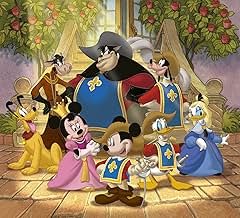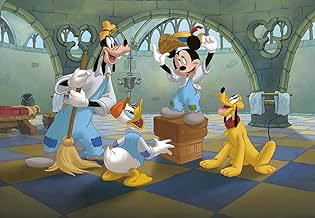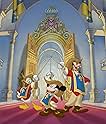Mickey, Donald, Goofy: Los tres mosqueteros
Título original: Mickey, Donald, Goofy: The Three Musketeers
CALIFICACIÓN DE IMDb
6.4/10
12 k
TU CALIFICACIÓN
Esta versión musical animada del clásico cuento de aventuras cuenta la historia de los mejores amigos Mickey, Donald y Goofy como limpiadores con grandes sueños de llegar a ser mosqueteros.Esta versión musical animada del clásico cuento de aventuras cuenta la historia de los mejores amigos Mickey, Donald y Goofy como limpiadores con grandes sueños de llegar a ser mosqueteros.Esta versión musical animada del clásico cuento de aventuras cuenta la historia de los mejores amigos Mickey, Donald y Goofy como limpiadores con grandes sueños de llegar a ser mosqueteros.
- Premios
- 1 premio ganado y 5 nominaciones en total
Bill Farmer
- Goofy
- (voz)
- …
Russi Taylor
- Minnie
- (voz)
Tress MacNeille
- Daisy
- (voz)
Jim Cummings
- Pete
- (voz)
April Winchell
- Clarabelle
- (voz)
- …
Linda Harmon
- Singer
- (voz)
- (sin créditos)
Jess Harnell
- Major General
- (voz)
- (sin créditos)
Candace Kita
- Host - Behind the Scenes Footage
- (sin créditos)
Argumento
¿Sabías que…?
- TriviaWhen Disney was trying to develop a Mickey Mouse feature film in the early 1940s, one of the ideas considered was "The Three Musketeers," but it was abandoned because the original novel requires four main characters (the titular musketeers and D'Artagnan), and the filmmakers found it difficult to come up with a good combination of established characters to fill the parts. Sixty-plus years later, the problem was solved by having Mickey, Donald and Goofy not play the original Three Musketeers and thus tell a story that parallels the original, but is not strictly an adaptation of it. The original Musketeers, incidentally, are the ones who saved the gang in the beginning of the film, and their autographs are in the hat they give Mickey.
- ErroresWhen Pete sings his "Bad Guy Song", he drops through the cellar on a rope attached to a basket of bricks, and hands Clarabelle his hat, telling her to watch out for the bricks, but the bricks were on the other side of the rope from her, though they hit her anyway.
- Citas
Pete: I didn't say drop a safe on her, you dolt! I said keep her safe!
The Beagle Boys: Well, that's good, 'cause we missed her.
- Créditos curiososThe closing credits are shown in a comic book style, in reference to the comic the Turtle/Troubadour was reading.
- ConexionesFeatured in Troldspejlet: Episode #31.4 (2004)
- Bandas sonorasAll for One And One For All
Music by Jacques Offenbach
(Excerpt from "Orpheus In the Underworld")
Lyrics by Chris Otsuki
Troubadour Vocals Rob Paulsen
Musketeer Chorus Amick Byram, Dwayne Condon, Randy Crenshaw, Kevin Dorsey,
Michael Geiger, Bobbi Page
Opinión destacada
Mickey Mouse, Donald Duck, and Goofy have been appearing together in animated skits for the better part of eighty years and have gone through a number of hilarious, and sometimes touching misadventures. I personally am very fond of "Mickey's Trailer," the 1938 Technicolor short in which the three of them made a somewhat haphazard journey taking their mobile home over a mount, especially when Goofy, who was driving, left the motor running as he ran inside to get breakfast. They've also been in a lot of humorous contemporary adventures, so it is rather surprising that their first feature-length movie together is not all that impressive. It's not a bad movie, although there were some things in it I genuinely hated, and its sixty-minute length makes it easily durable, but I really wanted this movie to hit harder. I wanted more laughs, more heart, more of that wonderful sensation that great animation can give us.
In the movie, the three mishaps stumble through predicament after predicament not as window-washers, not as locksmiths, not as painters, but as Alexandre Dumas's Three Musketeers. That is, loosely. To the movie's credit, it makes the appropriate choice of meshing the novel's 18th century setting with contemporary elements: the palace Mickey, Donald, and Goofy tend to is equipped with running water; a trio of hooded villains unsuccessfully attempt to assassinate Princess Minnie Mouse with an iron safe; Donald Duck tears off his uniform to reveal his traditional sailor attire. In the midst of their attempts to protect Minnie, the story is narrated by a singing turtle with a French accent, who stops in now and then with a few too many songs. The songs are a bold move, as they are set to the pattern of classical music. The one I liked the most was "Wings of Love," set to the Johann Strauss masterpiece "Blue Dunabe." I even got a chuckle out of a berating song toward Donald with Beethoven's Fifth thumping in the background. I was not, however, appeased by the opening and closing Musketeer themes—modeled after "Orpheus In the Underworld"—and could not stand for a second "Chains of Love" in which villainous Clarabelle Cow and affable Goofy fall instantaneously in love.
This segues into another problem I have with the story. It does not have much heart or sense of place, because it frequently twists its plot with left-field tricks. One of the movie's lamest gimmicks regards Donald Duck. At the beginning, he's supposed to be a coward, and when faced with danger, instead of losing his famous temper, he physically transfigures from a duck into a chicken. Literally. His beak shrinks down, he grows a red plumage, and he goes "Buck-Buck!" Ignoring the fact that I personally don't like it when Goofy gets a love interest, the romance that sparks between him and Clarabelle is out-of-the-blue, underwritten, and utterly pointless. To just have him escape her by slipping on a banana peel or driving her bonkers with his usual naivety as she attempts to throw him off a bridge would have been far more effective. The chemistry between Donald Duck and Daisy Duck is absolutely nonexistent, making their finale together even more useless. These two characters have worked together very well in the past, in the cartoons, when they are given time to work and play off each other. Not here.
But most saddening is how little is done between Mickey and Minnie. These are two of the cutest, most likable animation couples in history, and the screenplay gives them very little to do. Everything seems forced, as if the filmmakers threw it in because they were expected to. The scene where they first meet, where Mickey arrives as one of Minnie's new bodyguards, starts off charming and then slides into syrupy kitsch. They have a handful of smaller moments, but the big one in the middle still left me wanting more. As much as I liked the "Wings of Love" song, which plays behind them as they bond on a trip back to Paris, I would have preferred to see them banter and charm each other. Yes, they've been doing exactly that for more than seventy years, but that formula has not yet run out of steam. Not for me, at least.
There were some things I did enjoy. I really liked the directing by Donovan Cook; he does a terrific job at staging his animated sequences in wide-screen. Not everything is framed as though for a square screen. The defining moment is where Peg-Leg Pete (playing, obviously, the bad guy) is told that he needs to recruit bodyguards for Minnie. He looks past her and sees our three heroes bungling as they try to wash windows. The shot is brilliantly set in extreme-wide focus, so we see everything. A lesser director would have done it comic-strip style, cutting from Pete to the Musketeers, then back to Pete, then the Musketeers, and so forth. Mr. Cook toggles between wide and close shots very deftly, and his misc en scenes I appealing. I also really liked the usual Disney animation with its plethora of glorious colors in a world that really seems alive with detail. And I did enjoy most of the movie's beginning, with our heroes dreaming about becoming musketeers.
The second half of the movie, however, completely thuds, especially in its limp finale at an opera where the Musketeers battle with Peg-Leg Pete and the hooded figures whom I believe were modeled after the Beagle Boys from "Duck Tales." The twists and turns just do not play out well. Why, if Mickey, Donald, and Goofy are given a feature-length movie, does it have to be so brisk? Why not give them a full 90 minutes? This version of "The Three Musketeers" is not bad per se, but I really wanted something special when Mickey, Donald, and Goofy made their big-time debut together.
In the movie, the three mishaps stumble through predicament after predicament not as window-washers, not as locksmiths, not as painters, but as Alexandre Dumas's Three Musketeers. That is, loosely. To the movie's credit, it makes the appropriate choice of meshing the novel's 18th century setting with contemporary elements: the palace Mickey, Donald, and Goofy tend to is equipped with running water; a trio of hooded villains unsuccessfully attempt to assassinate Princess Minnie Mouse with an iron safe; Donald Duck tears off his uniform to reveal his traditional sailor attire. In the midst of their attempts to protect Minnie, the story is narrated by a singing turtle with a French accent, who stops in now and then with a few too many songs. The songs are a bold move, as they are set to the pattern of classical music. The one I liked the most was "Wings of Love," set to the Johann Strauss masterpiece "Blue Dunabe." I even got a chuckle out of a berating song toward Donald with Beethoven's Fifth thumping in the background. I was not, however, appeased by the opening and closing Musketeer themes—modeled after "Orpheus In the Underworld"—and could not stand for a second "Chains of Love" in which villainous Clarabelle Cow and affable Goofy fall instantaneously in love.
This segues into another problem I have with the story. It does not have much heart or sense of place, because it frequently twists its plot with left-field tricks. One of the movie's lamest gimmicks regards Donald Duck. At the beginning, he's supposed to be a coward, and when faced with danger, instead of losing his famous temper, he physically transfigures from a duck into a chicken. Literally. His beak shrinks down, he grows a red plumage, and he goes "Buck-Buck!" Ignoring the fact that I personally don't like it when Goofy gets a love interest, the romance that sparks between him and Clarabelle is out-of-the-blue, underwritten, and utterly pointless. To just have him escape her by slipping on a banana peel or driving her bonkers with his usual naivety as she attempts to throw him off a bridge would have been far more effective. The chemistry between Donald Duck and Daisy Duck is absolutely nonexistent, making their finale together even more useless. These two characters have worked together very well in the past, in the cartoons, when they are given time to work and play off each other. Not here.
But most saddening is how little is done between Mickey and Minnie. These are two of the cutest, most likable animation couples in history, and the screenplay gives them very little to do. Everything seems forced, as if the filmmakers threw it in because they were expected to. The scene where they first meet, where Mickey arrives as one of Minnie's new bodyguards, starts off charming and then slides into syrupy kitsch. They have a handful of smaller moments, but the big one in the middle still left me wanting more. As much as I liked the "Wings of Love" song, which plays behind them as they bond on a trip back to Paris, I would have preferred to see them banter and charm each other. Yes, they've been doing exactly that for more than seventy years, but that formula has not yet run out of steam. Not for me, at least.
There were some things I did enjoy. I really liked the directing by Donovan Cook; he does a terrific job at staging his animated sequences in wide-screen. Not everything is framed as though for a square screen. The defining moment is where Peg-Leg Pete (playing, obviously, the bad guy) is told that he needs to recruit bodyguards for Minnie. He looks past her and sees our three heroes bungling as they try to wash windows. The shot is brilliantly set in extreme-wide focus, so we see everything. A lesser director would have done it comic-strip style, cutting from Pete to the Musketeers, then back to Pete, then the Musketeers, and so forth. Mr. Cook toggles between wide and close shots very deftly, and his misc en scenes I appealing. I also really liked the usual Disney animation with its plethora of glorious colors in a world that really seems alive with detail. And I did enjoy most of the movie's beginning, with our heroes dreaming about becoming musketeers.
The second half of the movie, however, completely thuds, especially in its limp finale at an opera where the Musketeers battle with Peg-Leg Pete and the hooded figures whom I believe were modeled after the Beagle Boys from "Duck Tales." The twists and turns just do not play out well. Why, if Mickey, Donald, and Goofy are given a feature-length movie, does it have to be so brisk? Why not give them a full 90 minutes? This version of "The Three Musketeers" is not bad per se, but I really wanted something special when Mickey, Donald, and Goofy made their big-time debut together.
- TheUnknown837-1
- 19 oct 2012
- Enlace permanente
Selecciones populares
Inicia sesión para calificar y agrega a la lista de videos para obtener recomendaciones personalizadas
Detalles
- Fecha de lanzamiento
- Países de origen
- Sitio oficial
- Idioma
- También se conoce como
- Mickey, Donald, Goofy: The Three Musketeers
- Productoras
- Ver más créditos de la compañía en IMDbPro
Contribuir a esta página
Sugiere una edición o agrega el contenido que falta



































